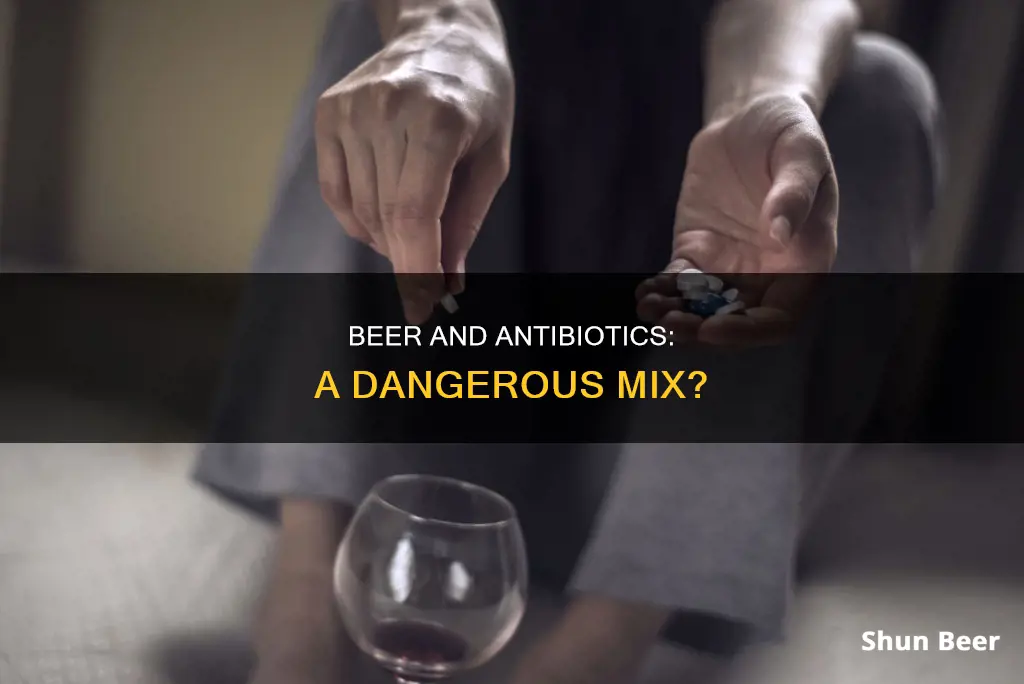
Drinking alcohol while taking antibiotics is generally not recommended, as it can increase the risk of developing side effects and hinder recovery. Alcohol can cause dehydration, digestive issues, and disrupt sleep, all of which can impact the body's ability to heal and fight infection. While moderate alcohol consumption usually doesn't reduce the effectiveness of antibiotics, certain antibiotics, such as metronidazole and tinidazole, can cause extreme side effects when mixed with alcohol, including nausea, vomiting, and increased heart rate. It's important to follow the advice of healthcare professionals and check with a doctor or pharmacist before mixing alcohol with any medication.
| Characteristics | Values |
|---|---|
| Effect on antibiotic effectiveness | Alcohol does not usually affect the effectiveness of antibiotics. However, it can interfere with the body's ability to absorb some antibiotics, making them less effective. |
| Side effects | Alcohol can increase the risk of developing side effects from antibiotics, including nausea, vomiting, stomach pain, flushing, and liver damage. |
| Recovery | Alcohol can slow down recovery from illness by causing dehydration, disrupting sleep, and weakening the immune system. |
| Drug interactions | Some antibiotics should not be mixed with alcohol, including metronidazole, tinidazole, cefoperazone, cefotetan, and ketoconazole. |
| Safe alternatives | Non-alcoholic drinks, such as mocktails, are safe alternatives to alcoholic beverages while taking antibiotics. |
What You'll Learn
- Beer and antibiotics can cause similar side effects, including stomach upset, dizziness and drowsiness
- Drinking beer while taking antibiotics may hinder recovery and weaken your immune system
- Beer contains alcohol, which can interfere with your body's ability to absorb some antibiotics
- Alcohol can increase the risk of unsafe side effects when consumed with medication
- Beer, like other forms of alcohol, can disrupt sleep patterns, which is important when recovering from an infection

Beer and antibiotics can cause similar side effects, including stomach upset, dizziness and drowsiness
Drinking beer while taking antibiotics is generally not recommended, as it can increase the risk of experiencing similar side effects caused by both substances. Beer and antibiotics can cause similar side effects, including stomach upset, dizziness and drowsiness.
Stomach upset is a common side effect of consuming beer and antibiotics. Antibiotics can cause digestive issues and stomach problems such as nausea, vomiting, and diarrhoea. Beer, on the other hand, can irritate the stomach lining and also lead to nausea and vomiting. When combined, the risk of experiencing these side effects increases.
Dizziness is another possible side effect of both beer and antibiotics. Antibiotics can cause dizziness as a central nervous system (CNS) side effect, especially when combined with alcohol. Beer, being an alcoholic beverage, can also cause dizziness, especially if consumed in larger quantities.
Additionally, drowsiness is a common side effect of both substances. Antibiotics are known to cause drowsiness, and beer, as an alcoholic drink, can also induce sleepiness. Consuming both together can amplify this effect, making it more pronounced.
It is important to note that the side effects of mixing beer and antibiotics can range from mild to life-threatening, depending on the individual and the amounts consumed. Therefore, it is generally advised to avoid consuming beer or other alcoholic beverages while taking antibiotics. Consulting with a healthcare professional is always recommended to ensure safe and effective medication use.
Beer Consumption: Implications on Gallbladder Health
You may want to see also

Drinking beer while taking antibiotics may hinder recovery and weaken your immune system
Additionally, antibiotics and alcohol can have similar side effects, including stomach upset, dizziness, and drowsiness. Consuming both simultaneously increases the risk of experiencing these side effects, and the risks can range from mild to life-threatening. Certain antibiotics, such as metronidazole (Flagyl), tinidazole (Tindamax), and sulfamethoxazole and trimethoprim (Bactrim), should never be mixed with alcohol as it could lead to severe reactions. These reactions may include flushing, headache, nausea, vomiting, and increased heart rate.
Furthermore, alcohol and antibiotics are both metabolized by the liver. Therefore, consuming excessive amounts of alcohol while taking antibiotics may increase the risk of liver and/or kidney failure. It is worth noting that some over-the-counter medications, such as cough syrups and mouthwashes, contain alcohol. As such, it is important to check the labels of these products before consuming them while taking antibiotics.
While not all antibiotics will result in severe reactions when mixed with alcohol, they can still cause drowsiness and delay recovery. It is generally recommended to avoid alcohol until you have completed your course of antibiotics and have fully recovered. Consulting with your doctor or pharmacist about alcohol consumption while taking antibiotics is always a good idea, as they can provide personalized advice based on your specific medication and health status.
Beer and Seizures: Is There a Link?
You may want to see also

Beer contains alcohol, which can interfere with your body's ability to absorb some antibiotics
Drinking alcohol while taking antibiotics can lead to dehydration, interrupt normal sleep, and lower your immune response, all of which can slow down your recovery. Additionally, alcohol can increase your blood sugar levels and zap your energy levels, further reducing your body's ability to heal from an infection. Acute alcohol use, binge drinking, and chronic alcohol use can all be harmful, whether or not you are taking medication.
Certain antibiotics, such as metronidazole (Flagyl®), tinidazole (Tindamax®), and sulfamethoxazole and trimethoprim (Bactrim™), should never be mixed with alcohol. Drinking alcohol with these antibiotics can lead to a more severe reaction, including side effects such as flushing, headache, nausea, vomiting, and increased heart rate. In some cases, alcohol can also lower the efficacy of antibiotics, as is the case with doxycycline.
It is important to note that alcohol is not only found in beer, wine, liquor, and mixed drinks, but also in some mouthwashes and cold medications. Therefore, it is crucial to check the labels of all products and discuss any potential interactions with your doctor or pharmacist before consuming alcohol while taking antibiotics.
Pilgrims' Beverage Choices: Beer, Rum, and More
You may want to see also

Alcohol can increase the risk of unsafe side effects when consumed with medication
Alcohol and Medication: A Dangerous Mix
Mixing alcohol with medication can be risky. Alcohol can increase the likelihood of adverse side effects when consumed with certain drugs, including antibiotics. While it may not always reduce the effectiveness of antibiotics, drinking alcohol while taking them can hinder your recovery and cause other unpleasant side effects.
How Alcohol Impacts Your Recovery
Drinking alcohol while taking antibiotics can slow down your recovery from illness in several ways. Alcohol can disrupt sleep patterns, prevent nutrient absorption, and reduce energy levels, all of which can impair your body's ability to heal. Additionally, alcohol can weaken your immune system, making it harder for your body to fight off infections. Dehydration caused by alcohol consumption can further complicate the recovery process.
Understanding Antibiotic and Alcohol Interactions
The specific side effects of mixing antibiotics and alcohol depend on the type of antibiotic, the amount of alcohol consumed, and the reason for the prescription. Common side effects of antibiotics, such as drowsiness, dizziness, and digestive issues, can be amplified by alcohol consumption. Additionally, alcohol can interfere with your body's ability to absorb certain antibiotics, reducing their effectiveness.
Antibiotics and Alcohol: A Potentially Dangerous Reaction
Some antibiotics should never be mixed with alcohol as it can lead to a dangerous reaction. These include metronidazole (Flagyl), tinidazole (Tindamax), cefoperazone, cefotetan, and ketoconazole. Combining these antibiotics with alcohol can result in extreme nausea and vomiting, abdominal discomfort, flushing, and other serious side effects. It is recommended to avoid alcohol completely while taking these antibiotics and for at least 72 hours after the last dose.
Lowered Efficacy and Increased Side Effects
Alcohol consumption can also reduce the effectiveness of certain antibiotics, such as doxycycline and erythromycin. Additionally, drinking alcohol while taking antibiotics can increase the likelihood of experiencing similar side effects produced by both substances, including stomach upset, dizziness, and drowsiness. In some cases, the combination of alcohol and antibiotics can lead to life-threatening reactions, depending on the individual and the amount consumed.
Precautions and Recommendations
When taking antibiotics, it is always advisable to follow the instructions and warnings on the drug packaging. If you have any doubts or concerns, consult your doctor or pharmacist. They can provide personalized advice based on your specific antibiotic, health status, and individual factors. Avoiding alcohol until you have completed your course of antibiotics and fully recovered is generally recommended.
Beer and Optavia: What You Need to Know
You may want to see also

Beer, like other forms of alcohol, can disrupt sleep patterns, which is important when recovering from an infection
Drinking alcohol while taking antibiotics is generally not recommended, as it can negatively impact your recovery from an infection. Beer, like other forms of alcohol, can disrupt sleep patterns, which is important when recovering from an infection.
Sleep plays a crucial role in the healing process. Getting a good night's rest allows the body to repair and regenerate, boosting the immune system to fight off infection. However, alcohol consumption can disrupt sleep patterns, leading to poor sleep quality. This interruption in sleep can hinder the recovery process, making it more challenging for the body to heal and recover from an infection.
Alcohol can also cause dehydration, which is another factor that can prolong recovery time. Dehydration can weaken the body, making it more difficult to fight off infection. Additionally, alcohol can affect digestion and liver function, further impacting the body's ability to heal.
While moderate alcohol consumption may not always reduce the effectiveness of antibiotics, it can still delay recovery. It is advisable to avoid alcohol, especially during the course of antibiotic treatment, to ensure optimal healing and recovery from an infection.
It is worth noting that some antibiotics, such as metronidazole and tinidazole, have specific interactions with alcohol that can lead to more severe side effects. These side effects can include nausea, vomiting, abdominal discomfort, and increased heart rate. Therefore, it is always important to consult with a healthcare professional before consuming alcohol while taking any medication, including antibiotics.
Beer and Chemo: What You Need to Know
You may want to see also
Frequently asked questions
Drinking beer on antibiotics is generally not recommended, as it can increase your chance of developing side effects and hinder your recovery. It is best to wait until you finish your antibiotics before drinking beer or any other alcoholic beverage.
The side effects of drinking beer on antibiotics can vary depending on the type of antibiotic, the amount of alcohol consumed, and the reason for the prescription. Common side effects may include increased drowsiness, dizziness, and digestive issues, as well as nausea and vomiting, and flushing. More severe reactions may include liver and/or kidney failure, chest and abdominal discomfort, and a disulfiram-like reaction.
Yes, certain antibiotics should never be mixed with any amount of alcohol as it could result in a severe reaction. These include metronidazole (Flagyl), tinidazole (Tindamax), and sulfamethoxazole and trimethoprim (Bactrim).
It is generally recommended to wait for some time after finishing your antibiotics before consuming alcohol. The waiting period can vary depending on the specific antibiotic, but it is often suggested to wait at least 48-72 hours.
Drinking beer while on antibiotics can have multiple negative effects on your body. It can cause dehydration, upset your stomach, disrupt your sleep, lower your immune response, and hinder your body's natural ability to heal. Additionally, alcohol and antibiotics are both metabolized by the liver, so consuming both together, especially in excess, can increase the risk of liver damage.







